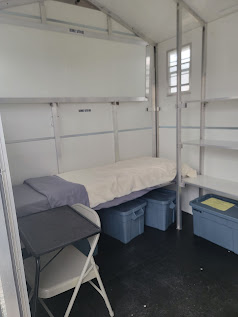Community Meeting: Supportive Homeless Housing in the Haller Lake/Bitter Lake neighborhood
Meeting recording: https://youtu.be/i-Dom3fETjo
The Haller Lake Community Club and the Broadview-Bitter Lake Community Council hosted three speakers on Oct. 19 related to housing the homeless in our neighborhood. We had Mark Ellerbrook from King County Department of Community and Human Service; Noah Fey, Director of Housing Programs, Downtown Emergency Services Center (DESC) and Josh Castle, Director of Advocacy and Community Engagement, Low Income Housing Institute (LIHI).
Mark Ellerbrook talked about King County's “Health through Housing” initiative, which creates long term supportive housing. The former “Extended Stay America” hotel, on Stone Ave N., just north of N 130th, will be used for that, but he concentrated on the program in general.
King county and the city of Seattle don't run housing directly; they contract with agencies like DESC and LIHI. Noah Fey, from DESC, talked about the new strategy on emergency housing in general, and in particular the “Mary Pilgrim Inn Emergency Housing” at 141st and Aurora, the former Holiday Inn. Josh Castle (from LIHI) talked about Tiny House Villages, and in particular, the Friendship Village coming to 125th and Aurora.
Mark Ellerbrook – King County
- “Health through Housing” started around a year ago, funded by a 0.5% sales tax increase.
- There are 6000 unsheltered people in King County.
- The emphasis now is on housing, not shelter. Supportive housing means people will be able to access services in the place they live.
- Return to homelessness (within 6 months) is around 2%.
- This is cost effective – 1 year of housing is the same cost as 3 months in County jail or 3 days at Harborview.
- Health through Housing 's county-wide short-term goal is 1600 units during the next calendar year.
- To be placed, a client must be chronically homeless (i.e. unhoused for a year) and have a mental or physical disability.
Noah Fay - DESC
- Since COVID, we are moving away from congregate shelters to hotels for people who were falling through the cracks. It reduces disease transmission and greatly improves overall well-being. The benefit to the unhoused is that they have time to think and plan for the future.
- It is a “housing first” model , with licensed behavioral health staff who handle crisis diversion outreach and response.
- There are 10-14 staff on site.
- They are close to hiring a dedicated neighborhood coordinator/liaison.
- The average age of their clients is 50 (many are over 60).
Josh Castle – LIHI
- LIHI runs 15 Tiny House Villages in Seattle.
- Each unit costs around $4,000. The median time of stay is 99 days.
- Friendship Village (coming to 125th and Aurora) will have 50 houses.
- Faith communities sponsor villages in a number of ways. Get involved!
- 53% of clients are moved to permanent housing.
- Talked about a Good Neighbor Agreement that neighbors can be involved with drafting.
- There will be a Community Advisory Council that neighbors can sign up to join.
Questions
- Many questions focused on the existing homeless in our neighborhood, esp. those camped on the field next to Bitter Lake, behind Broadview Thompson school. Unfortunately, none of the speakers are involved in moving people out of camps.
- What is the vision for homelessness services in the area since there seems to be many services coming to the area. There is no broad plan that led to the acquisition of the two hotels in our neighborhood; they were just good opportunity to get an appropriate building at a good cost. They prefer hotels with interior hallways to better control access; many of the hotels going on the market have exterior walkways. We would need to ask the City what the vision is.
- Many people curious why Aurora with high crime, drug use and prostitution was selected as an appropriate location for the housing. Speakers unable/did not to address these questions. Presumably because the buildings/land checked all their boxes mentioned earlier in the presentation and was purchased.
- A Tiny House can house two adults comfortably. Sometimes two are joined to house a family.
- What happens if people refuse housing even though these rooms will be available? Speakers unable to answer.


.jpg)

Comments
Post a Comment